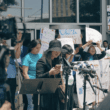Sign up here to receive The Yappie's weekly briefing on Asian American + Pacific Islander politics and support our work by making a donation.
Race-conscious admissions has long remained a divisive topic among Asian American communities, with different ethnic groups supporting and opposing the policy to varying degrees.
The Supreme Court’s decision to strike it down this week has re-opened a window into the conversations that have played out repeatedly across the country.
Here are two of those perspectives…
? When Michael Wang, a Chinese American graduate of Williams College, was rejected from Princeton, Stanford, Yale, and other top schools in 2013, he reached out to the first three to ask how race was considered for Asian American applicants.
- He told The Yappie’s Sonia Prasad that the universities’ responses indicated a lump sum categorization of international Asians and domestic Asian Americans—a non-answer that prompted Wang to file complaints with the Department of Education.
- Wang noted, however, that he doesn’t favor dismantling affirmative action entirely and instead supports “reforming” race-based policies to give economic background more weight.
- “Economic-based affirmative action makes the most sense,” he said. “I don’t know how you could possibly include Southeast Asians, Pacific Islanders, East Asians [in one category]. You’re putting … people with vast different experiences and vast different economic situations [together].”
? Kylan Tatum, a Black and Vietnamese Harvard student and pro-affirmative action organizer with Asian Americans Advancing Justice, told The Yappie’s Cindy Xie SFFA’s arguments imply that students who are at Harvard because of affirmative action “don't deserve to be there”—a claim they refuted.
- “How they’re explaining that is a lack of ability when, in reality, that correlates to a lack of opportunity,” Tatum said.
- Data points indicate that class-based admissions policies would fail to achieve current levels of racial diversity at many schools, they noted. Studies have found lower racial diversity in California and Michigan school systems after state-level affirmative action bans.
- Tatum also pointed out that “misinformation, particularly from larger media narratives,” has presented obstacles for coalition-building. “What I would like to do is to correct these narratives, particularly around a lack of cross-racial solidarity … to impact advocacy efforts in the future,” they added.
This story appeared as "The Big Story" in The Yappie's June 30, 2023 newsletter.
The Yappie is your must-read briefing on AAPI power, politics, and influence, fiscally sponsored by the Asian American Journalists Association. Make a donation, subscribe, and follow us on Twitter (@theyappie). Send tips and feedback to [email protected].









